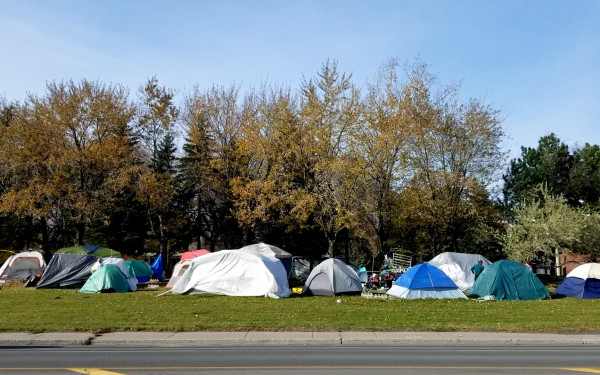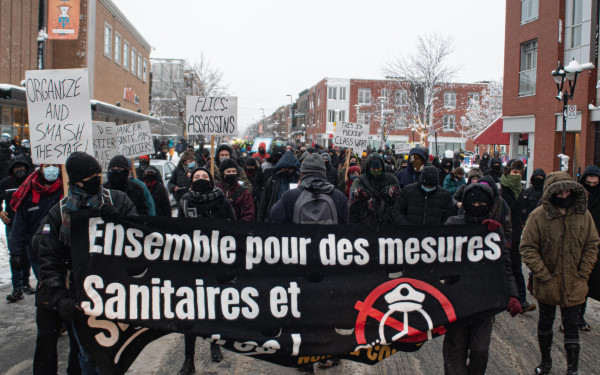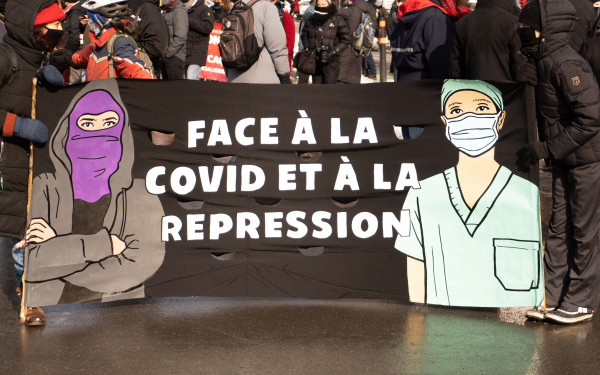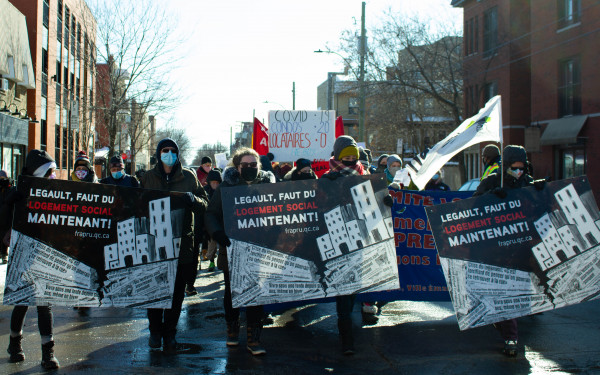Protestors demand affordable housing and less forced evictions
Hochelaga-Maisonneuve residents are fed up with development projects forcing poorer locals out of their homes
A crowd of around 70 residents and community workers in Hochelaga-Maisonneuve marched the streets on Oct. 30 to protest against Canoë, one of the neighbourhood’s latest development projects. The committees that organised the protest, which included l’Organisation des droits sociaux, and Industrial Workers of the World, want the borough to focus on creating more affordable housing instead of approving real estate projects that drive poorer people out of their own communities.
“What touches me most is to see that our communities are dissolving because there is a lack of action regarding housing,” said Claudelle Tremblay, a resident of Hochelaga-Maisonneuve who has lived there for many years. “I have seen people that I grew up with that can no longer come back and live here. That is what is shocking. This was a neighbourhood where, normally, we could continue living here because this was a poor neighbourhood but when the poor neighbourhood becomes ‘in,’ people have to isolate themselves in neighbourhoods with less community resources.”
The average household income after taxes in Hochelaga-Maisonneuve was around $45,000 in 2016 according to the Canada Mortgage and Housing Association. This was among the lowest of all neighbourhoods in Montreal.
Rachel Julien, the development firm behind Canoë, is only one among the many developers behind the gentrification of the borough. On Hochelaga St., protestors marched past a stretch of uninhabited apartment buildings that are being renovated by developers to create newer apartments for more affluent tenants. Currently, Hazout Group, another developer, has taken two properties on Théodore St., close to where the protest ended.
Marine Gourit, a community organiser with Comité de base pour l’action et l’information sur le logement social d’Hochelaga-Maisonneuve, invited protestors to contact her if they learn anything about what Hazout Group is doing in the neighbourhood so that her organisation can lend a hand by informing them of their rights as tenants. Oftentimes, she said, tenants do not know what they are entitled to from their landlords.
“There had to be a labour shortage for several rich bosses to panic and suddenly consider that the peanuts that they give us are perhaps not enough.” — Emmanuel Cree
“Buying properties in Hochelaga-Maisonneuve and doubling, tripling, or reselling them is the trend now because it is not expensive compared to other neighbourhoods,” she said, addressing the crowd. “This is exactly what is contributing to the increase in the price of real estate. It is the trend of renovictions and people know that they can make money very easily.”
Emmanuel Cree, a representative from Montreal’s branch of Industrial Workers of the World, stressed that unaffordable housing cannot be discussed without talking about low salaries.
“In the past week, many people spoke about minimum wage in the media, which is rare. There had to be a labour shortage for several rich bosses to panic and suddenly consider that the peanuts that they give us are perhaps not enough,” he said to protestors.
Madeleine Savoie, who has lived in the area for a few years, said the housing crisis is often dismissed as a problem that only concerns youth. She said the misconception that youth will all eventually move out of the lower class paints an inaccurate picture of the housing crisis that diminishes its true breadth and impact.
“The media always emphasises that it is youth who are attending these protests but having affordable rent isn’t a crisis that just affects youth,” she said.
Éric Alan Caldwell, one of Mercier-Hochelaga-Maisonneuve’s city councillors, was not immediately available to comment, attributing it to is busyness with the municipal elections. Pierre Lessard-Blais, the borough’s mayor, and Rachel Julien, did not respond to our request for comment.






